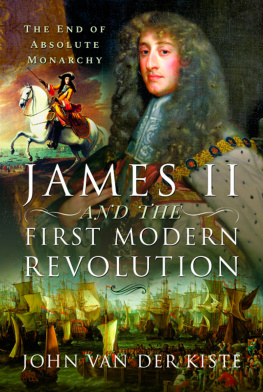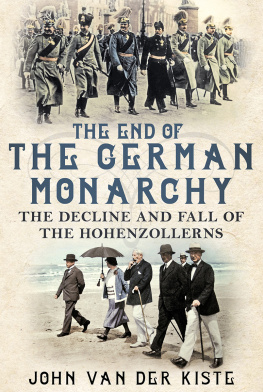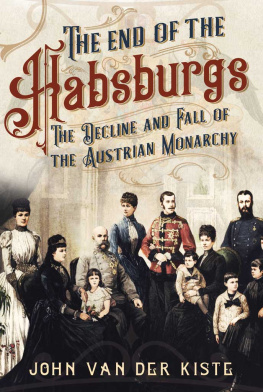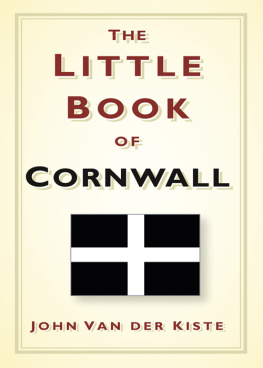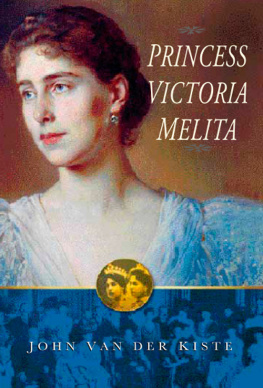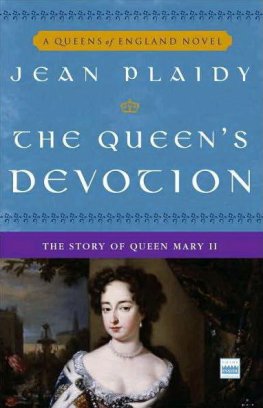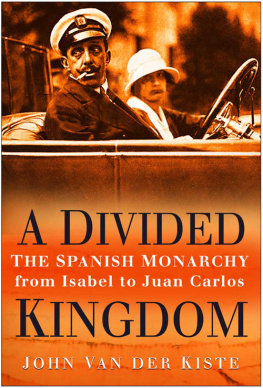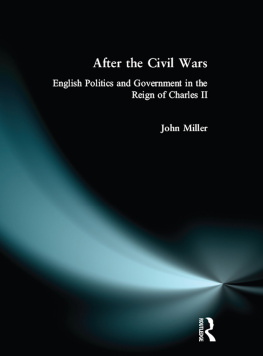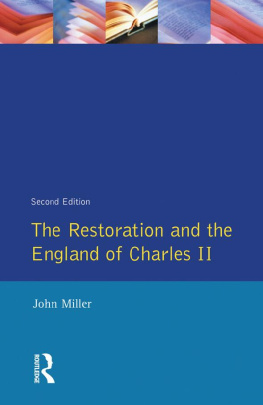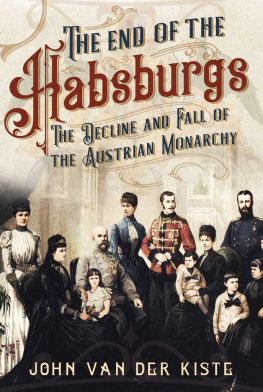Pagebreaks of the print version
JAMES II AND THE FIRST MODERN REVOLUTION
JAMES II AND THE FIRST MODERN REVOLUTION
THE END OF ABSOLUTE MONARCHY
JOHN VAN DER KISTE
First published in Great Britain in 2021 by
PEN AND SWORD HISTORY
An imprint of
Pen & Sword Books Ltd
Yorkshire Philadelphia
Copyright John Van der Kiste, 2021
ISBN 978 1 39900 140 3
ePUB ISBN 978 1 39900 141 0
The right of John Van der Kiste to be identified as Author of this work has been asserted by him in accordance with the Copyright,
Designs and Patents Act 1988.
A CIP catalogue record for this book is available from the British Library.
All rights reserved. No part of this book may be reproduced or transmitted in any form or by any means, electronic or mechanical including photocopying, recording or by any information storage and retrieval system, without permission from the Publisher in writing.
Pen & Sword Books Limited incorporates the imprints of Atlas, Archaeology, Aviation, Discovery, Family History, Fiction, History, Maritime, Military, Military Classics, Politics, Select, Transport, True Crime, Air World, Frontline Publishing, Leo Cooper, Remember When, Seaforth Publishing, The Praetorian Press, Wharncliffe Local History, Wharncliffe Transport, Wharncliffe True Crime and
White Owl.
For a complete list of Pen & Sword titles please contact
PEN & SWORD BOOKS LIMITED
47 Church Street, Barnsley, South Yorkshire, S70 2AS, England
E-mail:
Website: www.pen-and-sword.co.uk
Or
PEN AND SWORD BOOKS
1950 Lawrence Rd, Havertown, PA 19083, USA
E-mail:
Website: www.penandswordbooks.com
Acknowledgements
I would like to take this opportunity to thank my editors at Pen & Sword, Claire Hopkins, Laura Hirst, Lori Jones, Amy Jordan, and Alan Murphy, for between them suggesting the title in the first place and for their assistance in seeing the work through to publication; to Sue and Mike Woolmans for photographing the statues of King James and King William; and as ever, my wife Kim, for her support and for reading through the manuscript.
Introduction
In simple terms, the movement that has long been styled the Glorious Revolution was the abdication of King James II of England (VII of Scotland). During a reign of less than four years, his increasingly authoritarian and papist rule, in which he strongly favoured Catholics and antagonised the Protestant majority of his subjects, alienated Church and State alike. Faced with an invasion in his own kingdom from his son-in-law, William, Prince of Orange, and with his support rapidly ebbing away, he fled the country. A brief interregnum followed until Parliament confirmed the status of William and his wife, Mary, Jamess elder daughter, as joint sovereigns. This was, however, only the centre of a series of events in a labyrinthine timeline that embraced part of the seventeenth and eighteenth centuries, as well as campaigns at land and sea, and declarations and treaties involving not only the British Isles but also much of Europe.
If we also include the rise and fall of the Jacobite movement, which supported the restoration of the Stuart monarchy to the British throne, the boundaries go much further. Some would maintain that the revolution came full circle in 1746 with the defeat of Bonnie Prince Charlie, King Jamess grandson, at the battle of Culloden, and the subsequent withdrawal of support from France, its nearest and most powerful ally. Others would point to the death in 1766 of Bonnie Prince Charlies father, James, the son of King James II, whose birth in June 1688 and disputed paternity weakened what had become his fathers increasingly tenuous grip on the throne, as the end.
As to how the Revolution originated, one can make a case for saying it began with the Civil Wars of the 1640s, or the War of the Three Kingdoms of 1638-51, as the conflict is sometimes, if less often, known. There is an argument for choosing as the starting point the accession of King Charles I in 1625, or even that of the man who might be recognised as the first Jacobite, his father, King James I (James VI of Scotland) in 1603. The Jacobite cause may have withered and died in the mid-eighteenth century, but a short-lived Neo-Jacobite Revival was founded in 1886, with a number of Jacobite clubs and societies being formed. One of its major driving forces, the author and journalist Herbert Vivian, a friend of Oscar Wilde and James Whistler, stood four times as a parliamentary candidate on a specifically Jacobite platform, although he never attracted more than a handful of votes.
To try and untangle all the skeins that connect the various European powers and their role, active or passive, during the upheavals of the late seventeenth century, would require a book far longer than this to do it full justice. In this volume I have confined myself in the main to those figures at the centre of the revolution in Britain, based around James II himself, his immediate successors, and the thread that runs through their lives, times, the country that they ruled, and the consequences of what came with hindsight to be seen as a turning point in the nations history.
Were these consequences fully recognised at the time? There are grounds for believing that they were. Some might dispute this solely on the grounds that almost every age in history can be called a period of radical change for one reason or another. However, at least two prominent Englishmen alive at the end of the seventeenth century appear to have thought so. The term glorious revolution is thought to have been first used by John Hampden, a Whig radical who represented Wendover in the Convention Parliament at Westminster (and grandson of the better-known Ship money tax protester, also John Hampden, during the reign of King Charles I), in testimony before a House of Lords committee in 1689. The phrase also occurred in a sermon preached by Gilbert Burnet, Bishop of Salisbury and a close friend and confidant of King William and Queen Mary, in 1706, and by writer Walter Harris, in a published history of the life and reign of King William in 1749.
To commentators and historians of a later generation, the phrase was well merited when viewed alongside events across the Channel. According to Edmund Burke, in Reflections on the Revolution in France (1790), the English revolution was glorious because it had been carried out by Parliament, not by the mob whose counterparts were inflicting several years of violence, terror and executions in France after the overthrow of King Louis XVI. As is commonly said, history is generally written by the victors, and the Whig faction that emerged triumphant in 1688-9 called it a bloodless revolution and a pivotal point in Englands
G.M. Trevelyan saw its origins as coming from a different source. Writing in the 1920s, he maintained that its glory did not consist in any deed of arms, or in any signal acts of heroism on the part of Englishmen, nor in the fact that the nation proved itself stronger than its foolish monarch. Ironically, the English owed it largely to the ambition of a European head of state, admittedly one with an English mother. It had taken the efforts of a foreign fleet and army, both admittedly friendly and welcome, to enable Englishmen to recover the liberties they had muddled away in their frantic faction feuds. The glory of the British Revolution, he added, lay in the fact that it was bloodless, did not need either civil war, massacre, nor proscription, and above all that a settlement by consent was reached of the religious and political differences that had so long and so fiercely divided men and parties.

